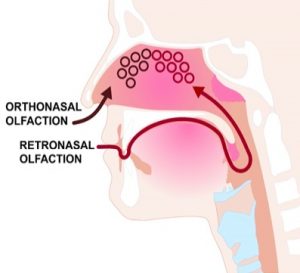October 13th, 2023
The Nose Knows: How Your Ability To Smell Wine Helps Your Ability To Taste Wine
Have you ever wondered why wine connoisseurs seem to make such a fuss about swirling their wine glasses and deeply inhaling the aromas before taking that first sip? If you’ve ever dismissed this ritual as mere pretentiousness, it’s time to think again. Smelling wine is a crucial step in the wine-tasting journey, and it’s not just for show. In fact, when it comes to experiencing the full spectrum of flavors in wine, the nose plays a pivotal role.
When we talk about smelling wine, we’re actually engaging in orthonasal olfaction, a fancy term for the external sense of smell. It’s that moment when you lift the glass to your nose and take a good, long sniff. It might seem like a simple act, but it’s far from it. The act of smelling wine is where you begin to unravel the intricate tapestry of scents that lie hidden within the liquid, waiting to be discovered.
The human nose is an astonishingly complex organ. It can detect thousands of distinct aromas, each with its unique character. When you bring a glass of wine to your nose, you’re not just inhaling a singular scent but a symphony of fragrances. These aromas originate from the grape variety, the winemaking process, and the aging in barrels. Some might be fruity, others floral, and still others may remind you of spices, herbs, or even the earth itself.
Now, here’s where things get even more fascinating. The second type of smell associated with wine is often mistaken for taste. This phenomenon is called retronasal olfaction, and it occurs when wine aromas travel from inside your mouth into your internal nasal cavity. This intricate process is what gives wine its distinctive flavor profile.
Picture this: you take a sip of wine, and it fills your mouth. As you swish it around, your tongue identifies the five basic tastes – sweet, sour, salty, bitter, and umami. But it doesn’t stop there. Simultaneously, the wine’s aromas are wafting up through the passage connecting your mouth and nose. When these same smells reach your olfactory receptors in the nose from this internal passage, they are registered as flavors.
So, why do we often say we are “tasting” when we are, in fact, primarily smelling? It’s because smelling and tasting happen in harmony, creating a seamless sensory experience. For example, when we describe a wine as tasting like a green apple, it’s not just our tongue that’s at play. Our nose is actively engaged in smelling that green apple scent while our tongue perceives that we are tasting it.
The connection between our sense of smell and taste is so intertwined that it’s nearly impossible to separate them. It’s why wine experts emphasize the importance of swirling the wine, allowing it to aerate and release its aromas, before taking that first sip. This ritual isn’t about showing off; it’s about enhancing the tasting experience.
The next time you find yourself with a glass of wine in hand, take a moment to savor the aromas that it holds. Inhale deeply, and let your nose guide you through a journey of discovery. You’ll be amazed at how much more vibrant and complex your wine will become as you unlock the secrets hidden within the glass. Smelling wine isn’t just a formality; it’s the key to truly appreciating the artistry that goes into each bottle. Cheers to the power of your nose in the world of wine!
 Shaunna and Shayla are the two sisters behind Wine Spencer, a contemporary wine brand that exists to inspire people to decant and appreciate the taste of wine. The two fell in love with wine early and chose to pursue WSET Level 2 sommelier certifications. Both were eager to share their passion with the world, so they joined forces, naming their new venture in the tradition of their father, grandfather, and great grandfather’s name ‘Spencer.’ It is a name that denotes stewardship, guidance, protection, and cherishing. Both sisters have a strong desire to redefine what wine means and give it a modern significance. Their focus is providing the wine novice and the oenophile an opportunity to create bespoke wine experiences.
Shaunna and Shayla are the two sisters behind Wine Spencer, a contemporary wine brand that exists to inspire people to decant and appreciate the taste of wine. The two fell in love with wine early and chose to pursue WSET Level 2 sommelier certifications. Both were eager to share their passion with the world, so they joined forces, naming their new venture in the tradition of their father, grandfather, and great grandfather’s name ‘Spencer.’ It is a name that denotes stewardship, guidance, protection, and cherishing. Both sisters have a strong desire to redefine what wine means and give it a modern significance. Their focus is providing the wine novice and the oenophile an opportunity to create bespoke wine experiences. This article has been revised from a version written in 2020.

